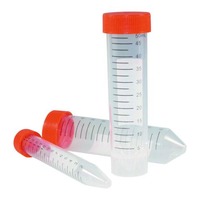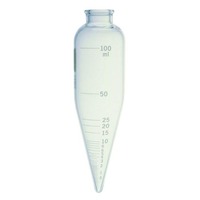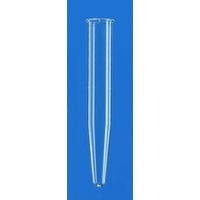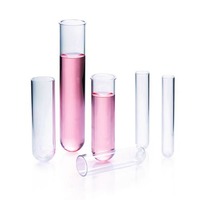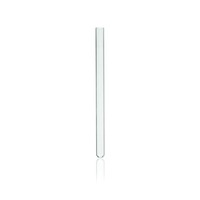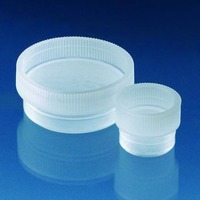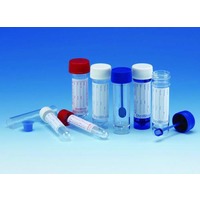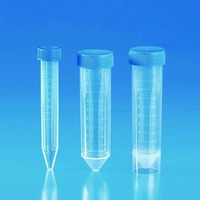-
- General laboratory consumables
- Occupational safety, Security
- Analytical measurement and testing
- Stirring, Shaking, Mixing
- Sample preparation
- Distillation, separation, filtration
- Heating and cooling technology
- Liquid Handling
- Vacuum technology, Drying, Dry storage
- Optical instruments and microscopes
- Cleaning and sterilisation
- Environmental-, soil-, water-, food analysis
- Chromatography
- Cleanroom
Centrifugation Tubes
Centrifuge tubes are specially designed to be placed in centrifuges to separate liquids, cells or other particles based on their density. During centrifugation, the contents are broken down into their components through rapid rotation around the fixed axis. The centrifugal force pushes the heavier components of the substance downwards, while the lighter ones remain at the top. In this way, solids can be reliably separated from liquids as well as substances of different densities.
LLG-Centrifuge tubes economy, PP

- With flat PE caps
- With conical bottom (15 and 50 ml) or with self-standing bottom (50 ml)
- Easy-to-read black volume graduations
- With a large frosted writing area
- Engraved graduation at the conical bottom of each tube
- Max. rotate speed up to 12000 x g for conical bottom tubes and 6000 x g for self-standing tubes
- Autoclavable at 121 °C and freezable to -80 °C
- Leak-proof
- Free of pyrogens
- DNase/RNase-free
- Aseptically or sterile
ASTM Centrifuge Tubes for Oils, with conical base, borosilicate glass 3.3

Conical bottom centrifuge tube is used for testing of petroleum products. Scale and legend are durable white ceramic enamel except California type. Top is tooled to accept snap cap. Conforming to USP Type I and ASTM E438, Type I, Class A requirements....
Centrifuge tubes Nalgene™, PC

Without closures. Friction-fit closures Type DS3111 for high-speed centrifugation please order separately. Transparent. Autoclavable. Can be used in refrigerated or ambient centrifuges at up to 50000 x g rcf. Temperature resistant from -135 to 135 °C. Lip (on Cat. No. 9.315 660 and 9.315 661) allows easier retrieval from rotor cavities....
Reaction tubes Safety-Cap, PP
The cap lock ensures an optimum tightness and prevents uncontrolled opening.
- Graduated
- Certified free of RNase, DNase, human DNA, PCR inhibitors, pyrogens and ATP
- High chemical resistance
- Labeling fields on the cap and tube
- Manufactured in clean room ISO 8
- Autoclavable with opened cap at 121 °C, 20 min
- Can be used down to -80 °C
Add to shopping cart
Centrifuge tubes as a customised solution
In order to meet the variety of different requirements, we offer centrifuges in a wide range of formats, sizes and materials.
Application and qualityCentrifuge tubes are used wherever the components need to be split - for example, for blood samples to separate the plasma, to isolate proteins or DNA, to collect cell cultures or microorganisms from cultures, for the concentration of particles from environmental samples... The range of applications is diverse.
The high demands placed on these analyses also mean that no compromises can be made when selecting the centrifuge tubes used. At Th. Geyer, we therefore focus on the highest quality and maximum safety - even at maximum speeds and high centrifugal pressure.
The materialYou can choose between plastic, glass and stainless steel for the raw materials used. While stainless steel usually plays a subordinate role, plastics such as polypropylene (PP), polyamide (PA), polyethylene (PE) or polycarbonate (PC) are the standard in laboratories and research environments. Depending on the type of plastic, centrifuge tubes can withstand very low to very high temperatures. They are stable against chemicals and can be translucent or opaque, depending on requirements.
Centrifuge tubes made of glass impress with their basic resistance to chemicals, acids, bases and organic solvents. The glass variants score points with their reusability and above-average durability. If required, glass allows a high degree of transparency and offers relatively easy handling If the material is subjected to high speeds during centrifugation, plastic is usually the better choice. Th. Geyer offers centrifuge tubes in both variants.The sizes
Th. Geyer meets the specific requirements for the dimensions and capacity of centrifuge tubes with a large selection of different sizes. These can be up to 500 ml, while sizes such as 50 mL and 15 mL are available for smaller filling volumes. In the micro range, centrifuge tubes are between 1.5 mL and 0.2 mL, which are mainly used in laboratories. Of course, we offer you a wide selection of all common formats.
The lid
During centrifugation, the lid of the centrifuge tube prevents liquid from leaking out. Traditionally, screw, push-in or plug-in lids are used for this purpose, which are easy to close. Micro centrifuge tubes are usually fitted with a snap-on cap. For very large variants, threaded lids ensure leakage protection. You will find both models with and without lids in our range. Depending on your choice, you can always order stoppers and the like separately.
The base
The different base variants also meet the respective requirements. The conical base with its slightly tapered shape allows for selective material collection, making separation and removal much easier Sample recovery is particularly high. Alternatively, you can also choose between self-standing centrifuge tubes with a flat base or a rounded base.
Benefit from our portfolio of centrifuge tubesAre you looking for centrifuge tubes for demanding applications? Th. Geyer offers a wide range of the highest quality. Functional, easy to handle and with an attractive price-performance ratio. Please feel free to send us your enquiry or contact us directly in person. We look forward to hearing from you!




